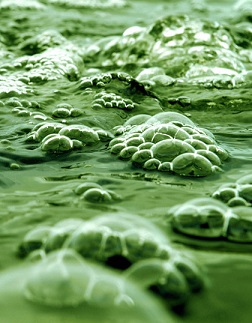Biofuel duo take ideas international
 Two Australian PhD students have reached the final round of an international competition thanks to their exciting project to cost-effectively produce biofuel from algae.
Two Australian PhD students have reached the final round of an international competition thanks to their exciting project to cost-effectively produce biofuel from algae.
Sofia Chaudry and Ashiwin Vadiveloo have been shortlisted alongside four other teams for the BASF Asia-Pacific PhD Challenge, which tasks PhD candidates with solving the world’s future mobility challenges.
BASF is the largest chemical producer in the world, and is running the PhD competition as part of its 150thanniversary celebrations.
The will now attend the final at the BASF regional headquarters in Shanghai, where they will be the only team from Australia competing against others from across the Asia Pacific region.
Mr Vadiveloo’s portion of the project involves maximising the productivity and growth of microalgae through the use of certain colours of the solar spectrum while diverting the remaining solar energy to photovoltaic devises that generate electricity to run the equipment needed to make biofuel.
Ms Chaudry is trying to design a process which repetitively extracts hydrocarbons from Botryococcus braunii – a species of microalgae – for her PhD. This process is known as milking and will make microalgae reusable.
“Currently making biofuel from microalgae on an industrial scale is expensive and not particularly efficient,” said Ms Chaudry.
“Our projects aim to address some of the efficiency issues involved with the process, such as only being able to use microalgae once for biofuel production and the way that only a small portion of solar energy is used for photosynthesis in the algae. We are trying to ensure all of the resources like fertilsers, energy from the sun and available land area, are being utilised effectively.”
Mr Vadiveloo added: “Microalgae-derived biofuels may provide a viable alternative to fossil fuels in the future and our projects aim to inform any future commercial venture.
“Sofia and I share some of the same supervisors and they suggested that we collaborate for this competition. We completed an online submission and have been interviewed by the BASF judges via Skype. It’s very exciting to be shortlisted as a finalist.
“We hope this will lead to research funding and further collaborations with industry.”
Ms Chaudry and Mr Vadiveloo will participate in two further rounds of competition at the finals – once with each other and once with a finalist from a different team.
The winners of the Challenge will travel to the BASF International Summer Course in Germany in August 2015 and the Global Science Symposium Shanghai in November 2015.








 Print
Print